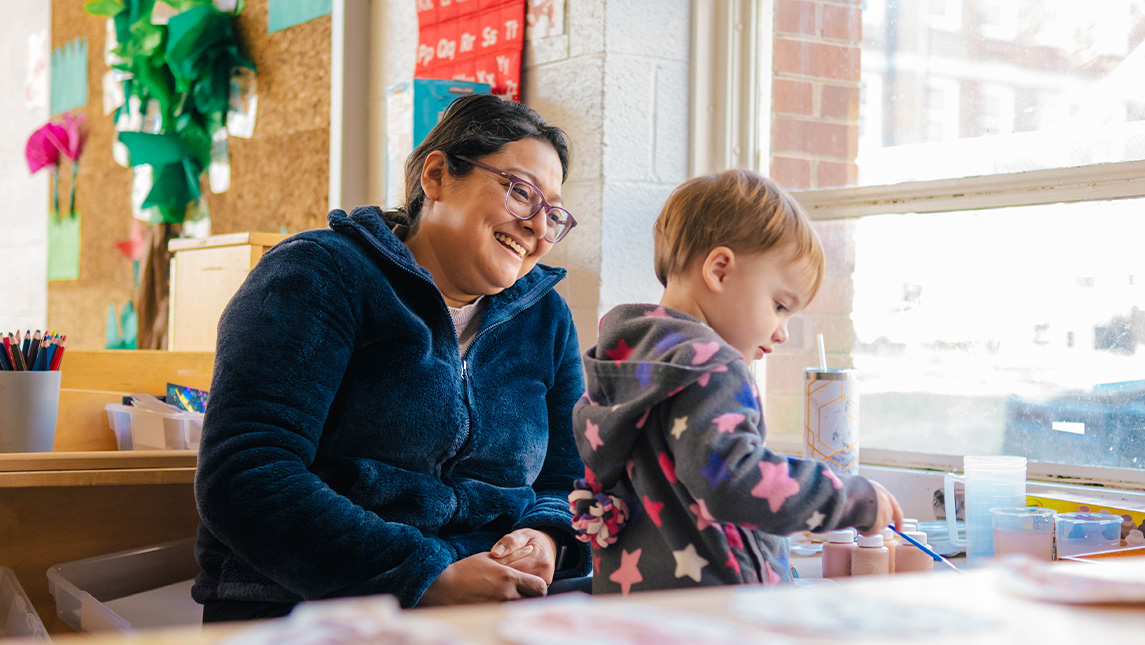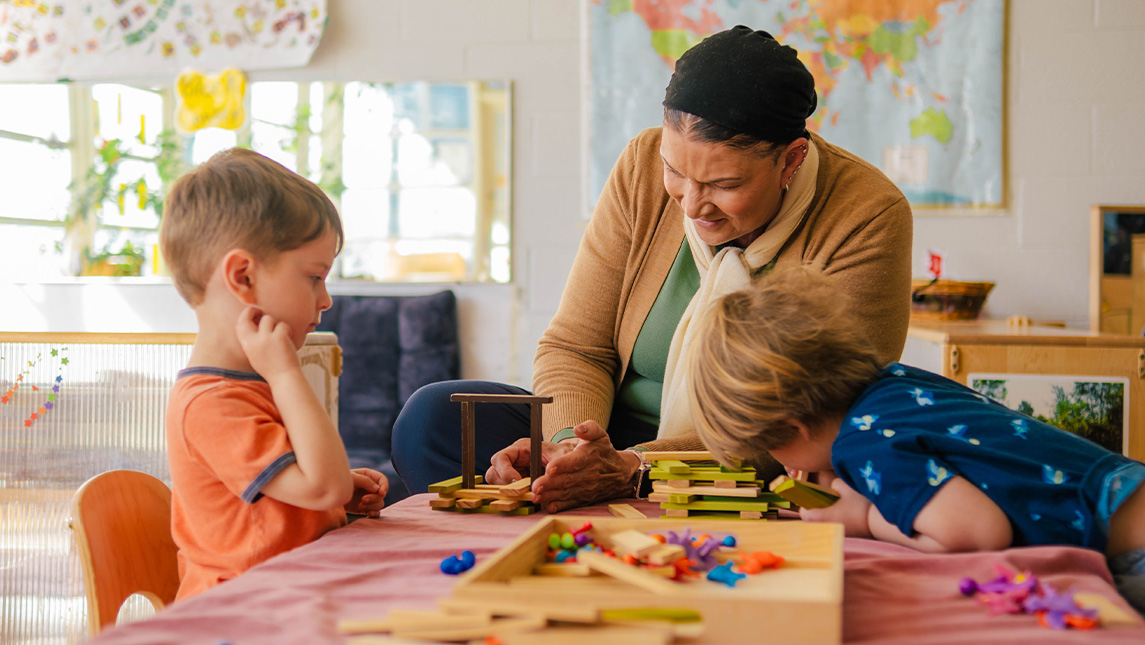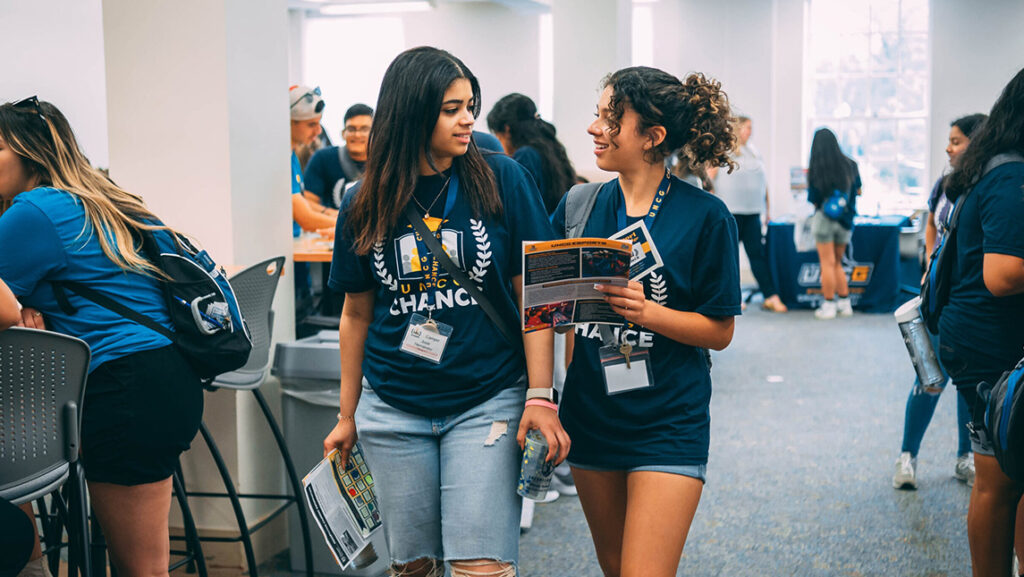The availability and cost of childcare across the country continues to be a challenge for working families, but a federal grant is now providing free childcare for qualifying student-parents at UNC Greensboro.
The Access to Child Care Enhances Student Success (ACCESS) Project is a U.S. Department of Education grant aimed at offering free childcare to children of qualifying student-parents in the University’s Child Care Education Program (CCEP). The primary targets for the program are student-parents who are either receiving or eligible for Pell Grants and/or are single parents. UNCG received the $224,102 grant in 2023 and now has five children enrolled – with the goal of eight for this year. Funding will continue for three additional years.
A LIFE CHANGING PROGRAM
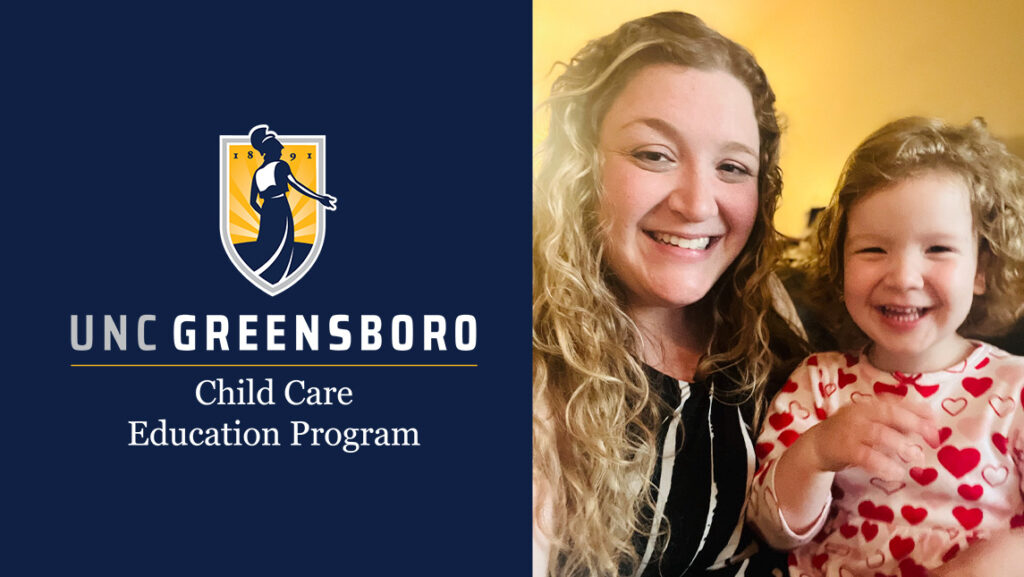
The main goal for Project ACCESS is to support student-parents by providing childcare so they can finish their degree.
“Finding out about this grant has truly been life changing for my family in so many ways,” says Jennifer Aikey, a music education doctoral student who is participating in the program. “The fact that students have a good place where their child can go and learn while they’re continuing their education is so vital.”
Aikey has two children, a 9-year-old and 2-year-old, with the latter requiring childcare while Aikey is in school and her husband works. She says, even before she came to Greensboro, finding affordable childcare was not easy.
“When we lived in the Atlanta area, childcare was about $200 per week for one child and it adds up quickly,” she says. “It was about as much as my mortgage payment.“
According to a 2018 analysis from the National Database of Childcare Prices, median childcare prices for one child ranged from $4,810 ($5,357 in 2022 dollars) to $15,417 ($17,171 in 2022 dollars) depending on provider type, children’s age, and county population size. These price ranges are equivalent to between 8% to 19% of median family income.
“I’m very thankful for the program,” says Desiree Di Gerolamo, a single mother who is a third year sociology major with a concentration in criminology and social justice. “My grades have been really good so I can tell it’s given me time to focus on my studies.”
“With any student-parent, childcare is essential for both work and school, so they are better able to focus on their studies,” says Catherine Scott-Little, professor in the Department of Human Development and Family Studies (HDFS) and director of the birth through kindergarten graduate program. “I see some students who even bring their children to class because they don’t have childcare. When there’s childcare available, they can attend classes more regularly and even take on a part-time job if that’s something they want to do.”
Di Gerolamo transferred to UNCG from a school in California and says finding childcare for her 1-year-old daughter was a concern.
“With her age, she depends more on me, and she clings to me. I was nervous thinking that I wouldn’t be able to get childcare and go to school,” says Di Gerolamo, who can focus on her schoolwork thanks to Project ACCESS.

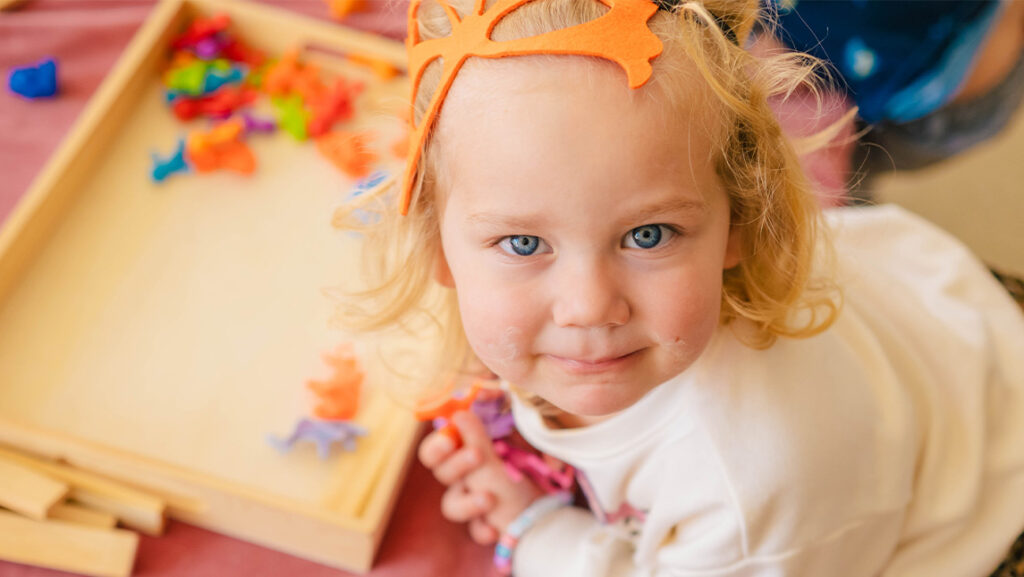
IT’S ALL IN THE NAME
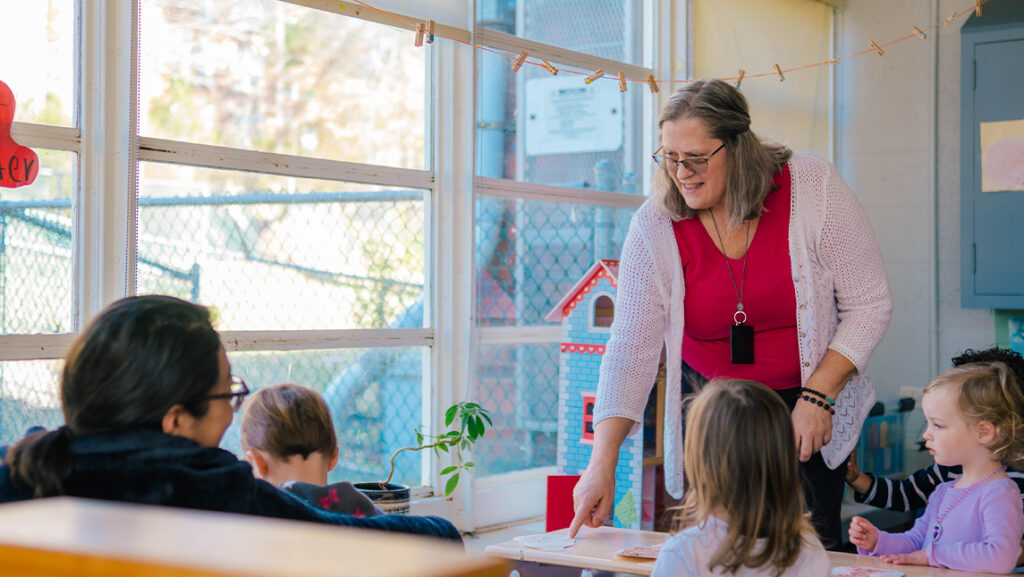
At the center of the grant program, as it’s named, is access – something CCEP staff say continues to be an issue for families.
“One thing that we know is space for younger children and infants is always the hardest to find,” says Christie Tongier, director of CCEP and an assistant professor in HDFS. “There just aren’t as many spaces as the community needs.” With the shortage of childcare, Project ACCESS is especially important for student-parents with limited resources to pay for childcare.
UNCG’s CCEP has served families for more than 90 years and currently enrolls up to 85 children from ages 12 weeks to 5 years old. The program not only provides childcare but is a learning space for UNCG undergraduate and graduate students in child development, early childhood education, and other related fields.
“I was familiar with lab childcare programs before I came to UNCG,” says Aikey. “My dad went back to college in his 30s so I was in a lab school, and I know they are great training grounds for students.” Families and children enrolled in the program, and UNCG students completing placements at CCEP benefit as students gain practical experience working with children.
There are three locations on campus: North Drive, Carter Center, and the Curry building. All locations are individually licensed centers and have been issued a 5-star license by the Division of Child Development and Early Education with the State of North Carolina. They also are accredited by the National Association for the Education of Young Children (NAEYC), indicating very high-quality educational programming.
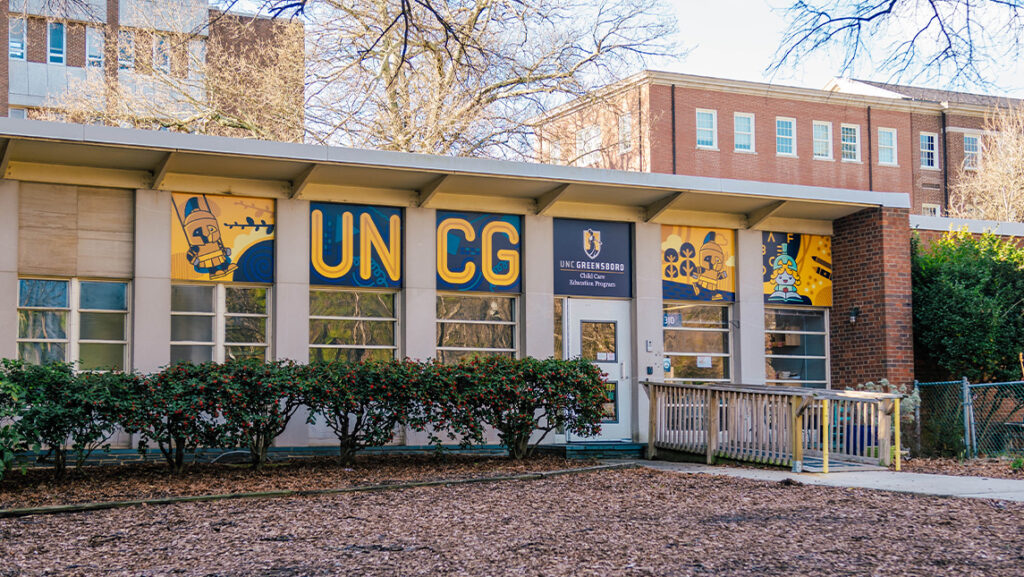
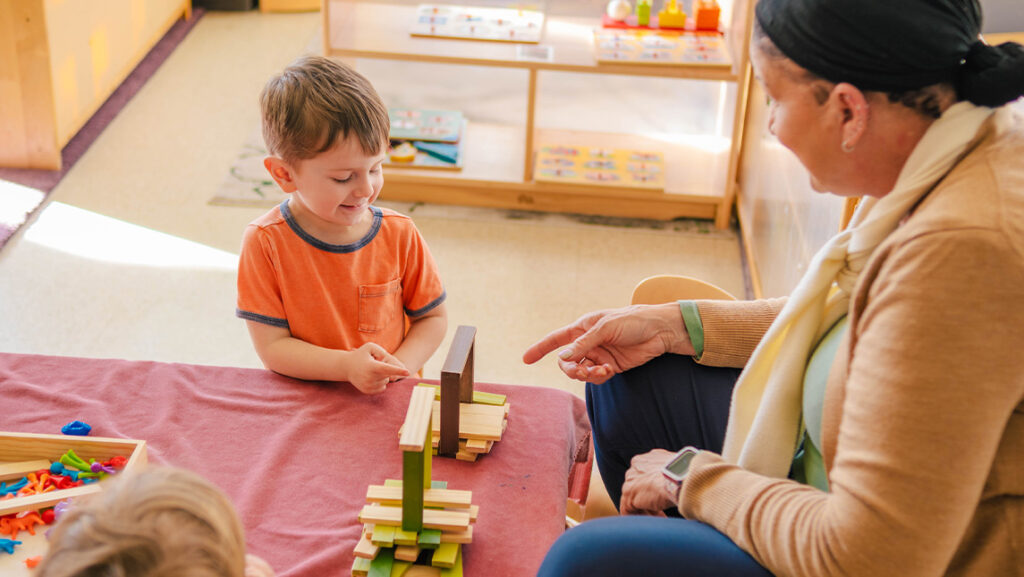
AN ESSENTIAL SPACE
The ACCESS Project aims to have eight children enrolled in the first year, 12 seats the second, and then 18 seats in each of the two years following – about 20% of the available seats at CCEP.
“CCEP has been here for a long time, but it has not always been accessible to students because of the cost” says Scott-Little. “We have a sliding scale tuition and we are well under the average cost for care in Greensboro, but it can still be out of reach for a student.”
The ACCESS project is currently accepting applications for Fall 2024. The first step for interested families is to send an email to CCEP@uncg.edu with the words “Project ACCESS” in the subject line. Part of the enrollment process is gathering demographic data and talking with staff about the program, which includes workshops offered through a parenting program called “Triple P” or “Positive Parenting Program.” The North Carolina Council on Economic Education has also partnered with CCEP to provide workshops on job education, budgeting, and future goals.
“What I love about the Child Care Education Program is they send updates on everything going on, like pictures of my daughter playing with her friends,” says Di Gerolamo. “I’ve also noticed she’s been meeting goals a lot quicker and, being in that environment, she’s picking up different, new words. It makes me really happy.”
Story by Avery Craine Powell, University Communications
Photography by Sean Norona, University Communications
Additional photography courtesy of Jennifer Aikey
